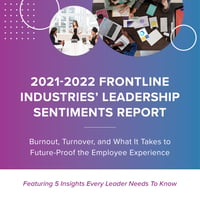The Grokker Innovation Labs’ 2021 Frontline Industries’ Leadership Sentiments research explores how managers are dealing with the challenges of workforce burnout and turnover 18+ months into the pandemic. Looking specifically at leaders in industries with large frontline workforces (including healthcare, retail/wholesale trade, and hospitality), the research uncovers best practices and emerging opportunities for managers to strengthen both team culture and working relationships to improve the employee experience and drive improvements in worker retention.
Here are some of the key findings:
86% of leaders experienced an increase in voluntary turnover in their teams in the past 18 months
While this isn’t surprising, considering the state of affairs in today’s job marketplace, it demonstrates the pressure leaders are under to take care of their teams and attract/retain new talent. Employers need to offer an employee value prop that resonates with what workers are looking for -- and what will entice them to stay engaged for the long-term.
The top 3 symptoms of burnout that leaders are noticing in their teams are mental health issues (e.g. stress, depression, anxiety), lack of focus and motivation, and reduced engagement and productivity.
When people experience these symptoms at work, they struggle to fully engage and participate. This makes presenteeism a major concern, especially when more than one employee is struggling with more than one symptom. Employers need to "be there" for workers and do what they can to offer the flexibility and resources people need to manage their mental health and everyday lives.
The employee groups that leaders are most concerned about supporting at this time are frontline and hourly workers, followed by working parents/caregivers.
Every employee needs “extra” support during trying times, but when a person is under extraordinary pressure to perform amid challenging circumstances — and added responsibilities — their risk for burnout and turnover increases dramatically. This means that it's critical for employers to take action (now) to support their people who are struggling the most; otherwise, these workers may seek greener pastures with employers who prioritize their wellbeing.
Almost all (98%) leaders feel that they have the ability to positively influence team culture, at least to a small extent.
The top 3 actions they’re taking to do so are personally checking in with employees, leading by example, and encouraging employees to take care of themselves. Leaders have the opportunity to more fully (and effectively) explore their inherent ability to improve the employee experience in ways that truly matter in their people’s daily work-lives. HR teams need to help their managers feel empowered with the resources and tools they need to connect with their people.
While most leaders are at least moderately satisfied with the level of support they’re able to provide for the main aspects of employees’ work/life, there’s room for improvement.
Nearly one third are satisfied to only a small extent (or not at all) with resources for physical health, mental health, and social connectedness. Employee expectations have increased along with their need for more robust whole-person wellbeing resources. Identifying what employees (and managers!) need is a step in the right direction. Asking them via surveys and check-ins is one way to start!
Less than half of leaders report having the tools they need to help employees feel cared for and valued, solicit input on employees’ challenges, and enable employees to meaningfully connect.
Managers need support in their efforts to improve team culture and worker loyalty, and they can’t go it alone. Employers, by way of their HR departments, can leverage their team leaders to improve workforce culture and communicate resources to those who need them most.
 Download the full report to take a deep dive into the research findings: what they mean to today’s workforce and how employers can start making a difference to the employee (and manager!) experience.
Download the full report to take a deep dive into the research findings: what they mean to today’s workforce and how employers can start making a difference to the employee (and manager!) experience.

